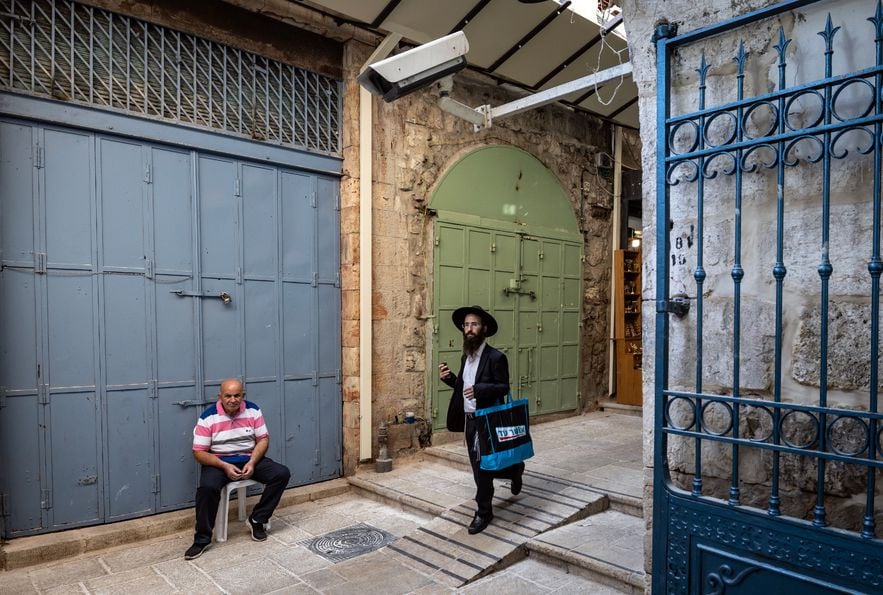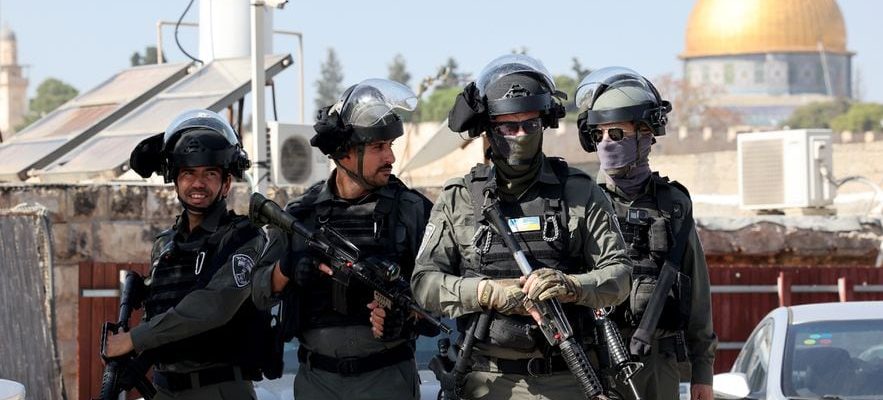Usually, the whole world meets on the promenade of the walls of the Old City of Jerusalem. As many tourists looking for a perfect selfie in front of the walls erected by Suleiman the Magnificent in the 16th century as believers hurrying towards the Western Wall (if they are Jewish), the Mosque Esplanade (if they are Muslims) or the Church of the Holy Sepulcher (where the tomb of Jesus is said to rest). On this mild November afternoon, Joaquim finds himself alone at the foot of the ramparts. With his left hand, he holds his 5-year-old son, Elio, tightly, while keeping an eye on his M16 assault rifle, which swings slung over his right shoulder.
This tall, dark-haired man, a computer scientist in civilian life, has just come out of a small armory in the center of the holy city, where he has renewed his stock of ammunition. His rifle was provided to him by the army at the start of the Gaza war, when he was mobilized along with 360,000 other Israeli citizens. “As an IDF reservist, we can carry our M16 in the street, even in civilian clothes,” explains Joaquim. “Since October 7, I never go out without one. A shooter can show up at any time and commit a massacre.”
The fear of a deluge of attacks
In the streets of Jerusalem, since the Hamas attacks, weapons are everywhere, carried by soldiers, reservists or even simple civilians, grouped in “self-defense” forces after dark. You feel the barrels of assault rifles brushing against you in the street or in a restaurant. In the holy city of the three monotheistic religions, where nearly a million inhabitants live together (around 60% Jews, 40% Palestinians), the fear of seeing Jerusalem go up in flames in a deluge of attacks has taken over .
“October 7 was a major shock to relations between Jews and Arabs all over the world, but in Jerusalem in particular,” a city hall official tells us. “As a Jew, you look with fear at the images of the massacred kibbutzim. As an Arab, it’s the same horror for the images from Gaza. The situation pushes people to return to their animal instincts.” A sign of the latent tension, pharmacies announce their promotions on pepper spray cans on their fronts…
Until now, Jerusalem has been relatively spared from the violence of the war. Hamas rockets do not target the holy city, for fear of hitting the Esplanade des Mosques. But attacks are never far away. Thus on November 16, at a checkpoint entering East Jerusalem, three men got out of a car and opened fire on Israeli soldiers. “It was continuous gusts, extremely violent,” describes a witness, whose bus accelerated at the first shot to flee. A soldier dies, the three Hamas men are “neutralized”, according to the vocabulary of the IDF. “A massive attack in Jerusalem, imitating the massacres committed near Gaza, was avoided,” local law enforcement assured that day. Almost every evening, clashes pit Palestinian teenagers against Israeli police officers, leading to several deaths in October.
Israeli security personnel stand guard as Muslim Palestinians participate in Friday noon prayers in the Ras al-Amud neighborhood on November 3, 2023 in East Jerusalem.
© / afp.com/AHMAD GHARABLI
Faced with this extreme tension, the Israeli authorities have taken unprecedented security measures. Patrol sirens ring out in Jerusalem day and night, particularly in the eastern part of the city, annexed by Israel after the Six-Day War in 1967. In these overwhelmingly Palestinian neighborhoods, the police increase checks every time. Street corner. “We no longer ask you just for your identity card, but for your cell phone,” reports lawyer Danny Seidemann, a specialist in Israeli-Arab relations in Jerusalem. “Then you are asked for your PIN code, and the police not only look at your networks social networks but also your private conversations, looking for any pro-Hamas message. If this is the case, they put you in prison. This process shows the state of extreme tension in this city and the way in which the police perceive the residents of East Jerusalem: potential enemies.”
Like many residents of East Jerusalem, civil rights activist Nivine Sandouka chooses to confine herself to her home, “while this wave of violence passes.” In his neighborhood, the majority of stores have closed doors, like cafes and hotels. Only the police station is open, with a dozen flags of the Jewish state flying around the establishment. “The other day, I was driving in the west of the city and I was terrified by the number of civilians carrying weapons,” says the director of the NGO Our Rights, which defends the political rights of Palestinians in East Jerusalem. “You have to consider the point of view of a Palestinian walking these streets: you know that at the slightest sudden movement, at the slightest wrong word, you become a target and you can be killed by another civilian.” Her 13-year-old son now only takes one trip: from home to school, then from school to home. Always driven by his parents. “It’s so easy to kill these days,” Nivine said, rolling her eyes.
The despair of the Old City
This stifling atmosphere has emptied Jerusalem of its main source of income: tourism. Only a few foreign journalists and Israeli refugees from the south of the country, who lived near Gaza, frequent the handful of open hotels. The old town seems to have returned to the times of the Covid-19 pandemic. Deserted. In this labyrinth of alleys, Jacob, black silk yarmulke on his head, runs home after having performed his daily prayer at the Wailing Wall. “I can’t hang around because there are Nazis everywhere these days,” says this father, speaking as quickly as his strides. “They just want to kill Jews, like in the kibbutzim…” Between two strong breaths, he dwells on his trauma of October 7, talking non-stop about this baby who was allegedly placed in an oven by Hamas – a rumor never confirmed.

An ultra-Orthodox Jew passes through an empty alley in Jerusalem’s Old City where a Palestinian is sitting in front of a closed store, November 2, 2023
© / afp.com/FADEL SENNA
Seeing him running away, Musef, an elegant merchant with a three-day beard, whispers: “They are all the same. Because of fear, no one comes here anymore and those who pass by don’t hang around.” Unlike during the Covid period, the merchants of the old city do not receive any economic support during times of war. He lives in East Jerusalem and only comes for one hour a day “to air out the store.” “We don’t see any customers anymore anyway,” he mutters, before offering a 70% reduction on his keffiyehs.
Youcef, for his part, drags his dismay near the Church of the Holy Sepulcher. This tourist guide, a Palestinian Christian, says he only met three journalists in six weeks. Not a single customer. He is reduced to begging for a few coins in the streets of Jerusalem, where he comes every day from his home in the suburbs of Bethlehem, the birthplace of Jesus according to the Bible. Youcef recounts the fear that grips his town in the West Bank, the incessant police checks, the clashes, his two children and his sisters who no longer dare to leave his house. On his way back to the Jaffa Gate, the sad-eyed colossus stops to admire the gardens of Jerusalem before him, then rubs the back of his head. “Say you just need a little love, and God will multiply it. You can trust him.”
.
